#kdrama tropes
Text
According to my masterlist, the only Kdrama lead I've seen so far without childhood trauma/sad backstory is Lee Jun-ho from Extraordinary Attorney Woo but that is probably only because we know absolutely nothing about his childhood.
48 notes
·
View notes
Photo
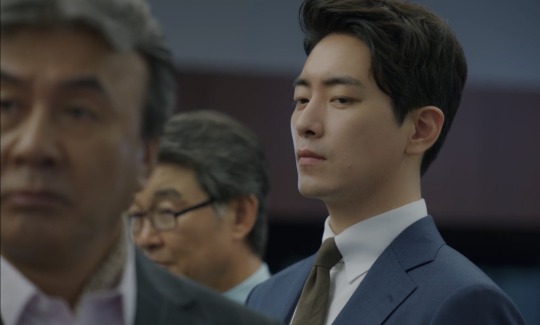
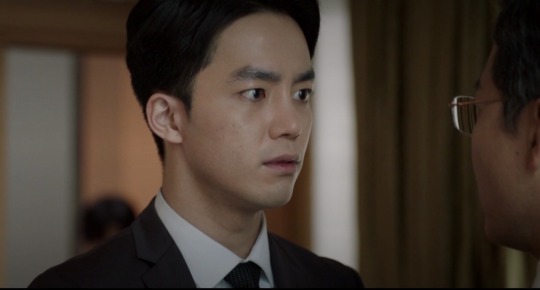
Is it a common thing for a wealthy ‘young master’ to have a poor live-in tutor/confidante/fixer who is pretty much abused by a senior member of the family? :)
29 notes
·
View notes
Text
Having a crush on this girl has me acting like an emotionally inept CEO in a kdrama. Why am I about to google “how to confess to a woman?”
10 notes
·
View notes
Text
The Great Misunderstanding Trope From Ye Olde K-dramas
Hello. So, I wanted to chat some more about this well known trope in Korean dramas from the 2000s and early 2010s.
Or if you ever picked up a romance novel from the eighties or nineties, this was one of the major tropes used there too.
I'm talking about the Great Misunderstanding trope.
Not that it ever went out of fashion exactly, but in the late 2000s, early 2010s, this had quite a resurgence and was used in pretty much every dramatic romance drama.
A drama that really exemplifies how dramatic this trope could get was secret from 2013, which had Ji Sung and Hwang Jung-eum.
There was a LOT of misunderstandings in that drama.
youtube
Now, typical of this trope is that the hero would be drawn towards the heroine despite believing the absolute worst of her. And the heroine would be in a situation where she can't clear up his misunderstanding for one reason or the other. Maybe she doesn't know that he believes the worst of her, or she's trying to protect somebody.
Maybe she's even trying to protect him.
And the hero's behavior gets really egregious, because on the one hand, he is terribly drawn to her almost helplessly. But on the other hand, he believes she is a really horrible human being. He's constantly experiencing inner turmoil because of her, and this crisis of feelings and beliefs makes him lash out at the heroine.
Since he believes the worst of her, his behavior towards her is the worst, and this is a key point of this trope.
The hero is constantly horrible to the heroine at this juncture of their relationship. While the heroine is either helpless to resist or hit back, or unwilling to hurt the hero in return.
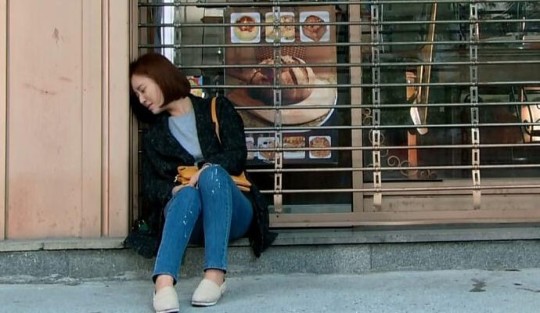
Maybe because she's just a genuinely good person and she just has a high tolerance for pain, like Hwang Jung-eum in Secret or she is protecting him, like Han Ga-in in Moon Embracing the Sun, when she comes back into the life of the king and the king believes that she is an imposter sent to like mess with his head because she looks so much like his first love and throws her in the prison for three days where she doesn't even get like a drop of water.
And while she is barely alive, he's just going about his life feeling disturbed that the situation happened, but not really thinking about her condition. And of course then her character goes through several other trials, which he could have put a stop to and would have put a stop to if he knew that she was indeed his first love and not an imposter.
But, of course that would completely skip over this period where the heroine suffers at the hands of his enemies and he just lets it happen. But because of this period of suffering, the hero later on feels abject remorse towards the heroine. He is utterly guilt ridden because she had to suffer so much because of him.
And added to that aspect is the fact that she never hit back at him. She was never horrible to him in return. This heroine is usually extremely Gandhian in her approach to the hero, turning the other cheek and all that. She is virtue herself.
And once the hero realizes that about the heroine and he grovels at her feet and the she gets a moment to be like, "I don't hold anything against you, but I may need two years abroad to rethink life and to come back more deserving of you."

That's a whole other trope, but the point is that she gets a moment to sort of get the upper hand in the relationship. Now, this is an interesting aspect of this trope, this upper hand. The relationship dynamic between the hero and the heroine is such that the hero usually occupies a higher position in society.
He is richer, more powerful, maybe he's a celebrity. Either ways. He's in a different, entirely different strata than the heroine. And the heroine is really weak. Maybe she has been emotionally devastated by something that has happened in her life. She's definitely financially in a weaker position and probably also socially from a different class.
This huge class gap is one of the major reasons that this trope exists, and we'll come back to that in a second. The heroine starts the journey in this really weak position, but at the end of the story, the heroine is barely the hero's equal, and the way she becomes his "equal" is by getting the moral upper hand.
And the upper hand doesn't really put her in a higher position than him. It's not like for the rest of their life, they're going to have arguments and she'll bring up what he had done before and he'll be like, yes, you win every argument ever. No, that's not what the story is going for.
The story is making very sure we understand that the gap between them at the start of the story is so huge that the hero finally understanding the heroine's true virtues and how good she is, and that she had never done those awful things he believed of her and that she had suffered in silence while he tortured her - all of those things and the hero's guilt barely brings the hero up to be kind of his equal, at least equal enough that now they can have a relationship.
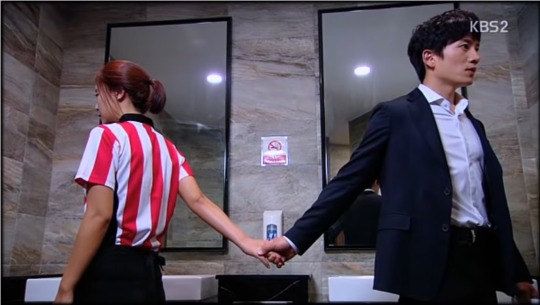
The heroine comes up in the world, hero doesn't go down at all. He loses only one thing, and that is the right to look down on the heroine, and that is an important aspect of the Great misunderstanding because as you might have noticed till now, I have been specifically telling you about how the hero is the one doing the misunderstanding, the heroine is the one being misunderstood. This particular trope usually flows in this fixed direction. The genders are pretty much fixed.
Occasionally they try to flip it, but the dynamic immediately becomes weaker and the story isn't as interesting.
I'm sure the dramas of decades before this period also had the great misunderstanding used liberally, but it was used to an excessive amount during that period, the late 2000s, early 2010s.
And the reason for that was that the class difference was still quite huge. And women still had fewer opportunities. They were coming up, but they were not quite there yet. And you have to understand, Korean dramas were primarily written for middle aged women who were housewives and/or working. And for most of them, their economic strata was kind of fixed.
There wasn't really a lot of opportunity to come up in the world in the decade after that. Even though the real world wealth gap hasn't exactly decreased, but you must have noticed that dramas no longer tell the stories of really poor women and really rich men. They tell the stories of really rich men and women who are middle to upper class, but don't feel inferior to these rich men.
Their upbringings, even though there is definitely a difference in wealth, no longer makes the two feel like they are from different worlds in terms of the education they got, the exposure they have in the world.

So, from the heroine's perspective, the gap between the two of them doesn't seem so impossible to bridge anymore these days, but back then it was HUGE. The heroine wouldn't look at the hero and think, hey, that's a guy I want to date. The hero would look at the hero and be like, I am drawn to her, but I cannot date her.
We saw examples of this in, let's say in Secret Garden where Hyun Bin was drawn to Ha Ji-won's character. He pursued her, but not for a relationship. He just pursued her heedlessly, but then anytime she reciprocated, he would be the one to point out how much of a gap there is between the two of them and how they could never be a permanent thing.
He was willing to offer her the position of his mistress, but not his girlfriend.
Another Hyun Bin drama is, my name is Kim Sam-soon, where you also had elements of the great misunderstanding, but it was essentially that class divide that made Hyun Bin's character again look down on Kim Sun-ah. Who was poor, clumsy, supposedly overweight and definitely from a different world class-wise than Hyun Bin's character.
So the class divide really is ultimately the reason why the great misunderstanding trope existed.

But you didn't always need the great misunderstanding trope to exist in a story to talk about class. Like I just said my name is Kim Sam-soon and Secret Garden both did that really well.They actually faced the question of class divide and how two people from two different strata would overcome that.
Those stories were directly challenging the idea of the class divide.
The stories that employed the great misunderstanding didn't really want to directly talk about the class divide. They wanted to solve that problem, the problem of the woman being from a weaker section of society, and also just having like a weaker position within the relationship with the hero without really underlining what the problem was.
So why was the trope so popular at the time? Because the class divide existed in reality and the drama watching audiences wanted more stories about it. And this was a morality play where the virtuous heroine has to go through this traumatic trial by fire to prove herself.
But once she has proven herself, the hero can never doubt her again.
The hero would now forever be so grateful that she has forgiven him for his big mistake in not knowing how wonderful she is, that he will never abuse her, he will never mistrust her, he will never doubt her.
Once their love is affirmed in this way, she emerges, virtuous, victorious, and having secured the love of this man.
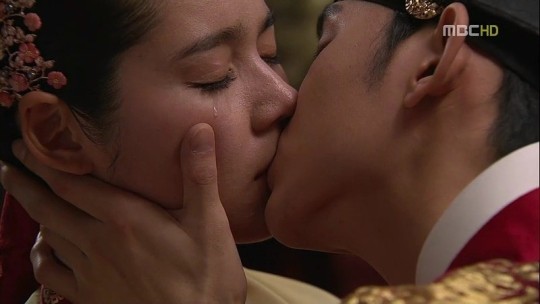
And if you haven't figured it out yet, the great misunderstanding trope ultimately is not about the hero being a jerk to the heroine. It's about the heroine going through a hero's journey. To finally land up in a place where she is powerful enough to be the hero's equal morally. This is a female empowerment fantasy.
This was all we wanted. We wanted the hero to acknowledge the heroine's goodness and never doubt her. And of course, we as the audience absolutely love this. We loved that the heroine was sort of the personification of goodness. She may be clumsy, she may be silly at times. She may make poor decisions. She may make us extremely frustrated because she refuses to tell the hero the truth, whatever the truth may be.
But ultimately, we absolutely love the fact that the hero, once he figured out how wrong he was, how terribly he had treated her, and how much he owes her, once that moment struck, that's when the real payoff would happen. And of course then we had dramas like Secret where they would use the great misunderstanding to create some of the steamiest moments between the hero and the heroine.
Seriously, Ji Sung and Hwang Jung-eum had the most messed up dynamic in that story, and yet it's like seared in my brain. That was crack.
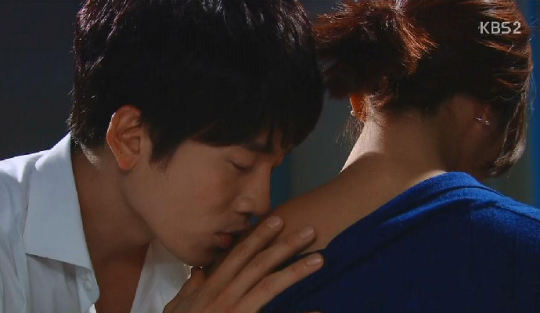
Now, something else to keep in mind is that the great misunderstanding has been used in modern day romances quite liberally as well. But this - what is used these days - is the great misunderstanding lite.
Like, you have Our Beloved Summer where the hero doesn't actually know why the heroine had broken up with him and sort of misunderstands her intentions, and then years later finally figures out why she was forced to break up with him at that point.
Or you have Love Is For suckers, where the heroine realizes that the hero has feelings for her, but she's still feeling conflicted. And she also knows that another woman deeply loves the hero and she doesn't want to come between them. So, she lets the hero misunderstand her, which creates a chasm between the two of them.
So you do have these instances of misunderstanding. It's not that dramatic because there really is no great payoff. There is no groveling hero. There is no guilt. There is no internal misery. There is no irresistible attraction that is constantly pulling the hero and hero in together. And they are just dying inside because they can't be together.
It's not that dramatic anymore. It's simpler.
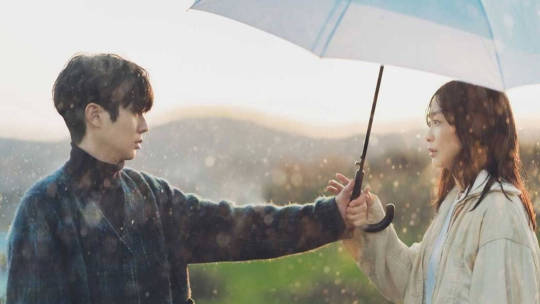
Which on the one hand is a good thing. It's a good thing, but it also makes for less memorable stories.
I was trying really hard to think of more instances where the misunderstanding lite trope has been used in dramas recently, and I know there have been tons.
I just don't remember because, it was not that interesting. I just think, if you have to use that trope, it's maybe worth it to go full fledged, like modernize it, make the woman less of a dish rag or flip genders, but really commit to the trope. Don't just use it as this one throwaway thing that happens for two episodes.
That is a waste of a trope that could genuinely create a lot of heat and trauma, but also, I'm sure in the hands of good writers create moments where the hero and heroine could really talk about their differences - whether it's moral, ethical, political, religious, economic, or a clash of egos - actually get into the depths of why the two of them felt so torn asunder despite being attracted to each other.
I am sure we can modernize it and still keep the drama aspect of it.
It doesn't have to be this morality tale that requires the woman to be a saint. So that she could just barely be equal to the spoiled rich hero.
------
This essay was originally published as a video on The Drama Note YouTube Channel.
#misunderstanding trope#old kdramas#kdrama scenes#kdrama tropes#secret garden#ji sung#secret 2013#hwang jung-eum#hyun bin#kim sun ah#my lovely sam soon#the moon embracing the sun#kim soo hyun#han ga in#kdrama nostalgia#our beloved summer#hero misunderstands the heroine
23 notes
·
View notes
Text
Only in My Liberation Notes can a character go through hell, separation and reunion with another character and then a few years later say, “About my name, it’s Gu Ja-gyeong”
#jtbc my liberation notes#my liberation diary#my liberation notes#gu ja-gyeong#yeom mi jeong#yeom chang hee#sad kdrama#kdrama tropes
70 notes
·
View notes
Text
'Why her?' proves once again that found family is the best trope ever
#sbs why her#why her#why oh soo jae#oh soo jae#gong chan#hwang in yeop#seo hyun jin#kdrama recs#kdrama tropes#kdrama#found family#found family trope
31 notes
·
View notes
Text
screw enemies to lovers i’m here for enemies to brothers
#writing#fanfiction writing#writing tropes#enemies to lovers#enemies to brothers#kdrama#kdrama tropes
4 notes
·
View notes
Text

new kdrama just dropped
1 note
·
View note
Photo


I’m getting more and more convinced Korean dramas have their own version of the multiverse of madness. Otherwise, how come Lee Kyu Hyung is a prosecutor with a tragic backstory both in Doctor Yohan and Stranger? I’ve just realized it’s the same person :)
#Doctor John#doctor yohan#stranger#lee kyu hyung#kdrama#korean dramas#multiverse of madness#kdrama tropes
4 notes
·
View notes
Text
You know who’s always a delight in a kdrama? A meddling grandpa.
2 notes
·
View notes
Text
i couldn't pick only one! the ones in Coffee Prince and My Mister are too different but equally dear to me
#piggyback#coffee prince#my mister#kdrama tropes#my sunny eun chan and han gyul carrying each other#my sad fish man with halmeoni on his back#shut up you're not rewatching all that again#although#i haven't watched CP IN A WHILE#and it's summer!#okay no need to twist my arm
1 note
·
View note
Text
Accidentally in Love gave understated found family excellence. The kind girl who has a soft spot for the antagonistic dude at school, the goody two shoes who has trouble with finding his own way, the idol who is haunted by expectations of perfection but really is a softie at heart, the loud girl who is undercover to find out a family secret but finds a second family instead.
#accidentally in love#cdrama#chinese drama#found family#found family trope#kdrama#kdrama tropes#cdrama tropes#netflix dramas
20 notes
·
View notes
Text
every single kdrama having a love triangle is actually why i can't find happiness in life, fuck love triangles fuck kdramas with love triangles
0 notes
Text
I started watching Kdramas this year and I do a lot of literature analysis in my normal life, so I found it really fun to find the tropes that were unique to this genre/culture that were different than what I find in Hollywood TV/movies and novels. I started with Alchemy of Souls and I was kind of amused looking back, because I never thought the SML had a chance with the FL but if I had known how strong the "they met as children and therefore DESTINY" trope is, I probably would have thought they would get together for sure!
Here are some of the unique tropes I've noticed:
-Leads meet as children and therefore DESTINY (What's Wrong with Secretary Kim, 100 Days My Prince, It's Okay to Not be Okay, Castaway Diva, The King's Affection, Sh**ting Stars, Destined with You, subverted in Alchemy of Souls)
-Reincarnation, which happens a ton but of course for the same reason Western media is littered with Chosen One/Saviour plots (played with in Alchemy of Souls and Extraordinary You, straight in Destined with You, Tale of the Nine Tailed, Moon in the Day, My Demon, The Story of Park's Marriage Contract... so many)
-Guy (usually) buys the girl shoes and then puts them on her. They also usually make a joke about her running away. (Tale of the Nine Tailed, 100 Days My Prince, Extraordinary You, Castaway Diva, King the Land, subverted in The King's Affection and The Forbidden Marriage)
-Guy (usually) gives/brings the girl an umbrella to protect her from the rain. I LOVE THIS TROPE, symbolism for protection and shelter gets me (straight in My Lovely Liar, King the Land, Tale of the Nine Tailed, Extraordinary Attorney Woo, subverted/played with in Alchemy of Souls, Business Proposal, Doom at Your Service, Castaway Diva)
-Not sure if this would count as a trope, but unique to the genre because we don't have formal speech in English and especially not in Canada where I live (we've basically started just going first name with everyone) I love it so much when the main characters use informal terms with each other for the first time. The subtitles don't always translate this well, but I know what the honorifics sound like and I'm all, "She didn't use "Mr." that time it's serious now!!!"
Anyway, are there more? I'm probably not catching them all!
Edit: Definitely some sort of trope around characters finding wild ginseng to solve a problem.
(I've only been watching Korean dramas by the way, I'm sure some of these tropes are shared by other dramas from China and Thailand. I just found the comparison with English language TV interesting.)
#kdramas#tropes#alchemy of souls#my demon#castaway diva#my lovely liar#king the land#tale of the nine tailed#doom at your service#what's wrong with secretary kim#100 days my prince#extraordinary attorney woo
352 notes
·
View notes